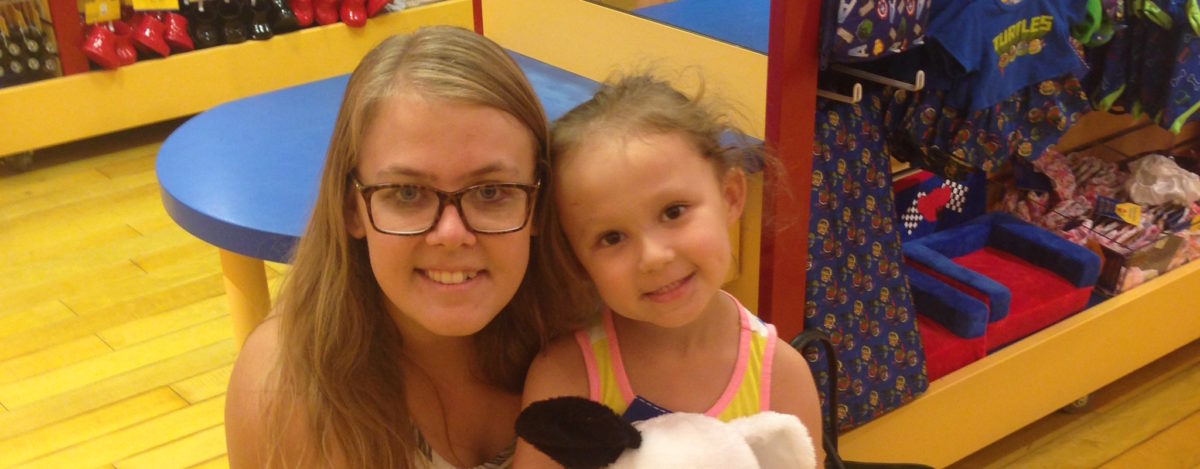Some Things Are Meant to Be
While science hasn’t yet given us a solid answer for why some people develop type 1 and others don’t, most of us realize somewhere along the way that we were given this disease because it gives us the opportunity to make a difference in some way: whether it’s raising awareness, becoming a medical professional, or doing research to help find a cure, it’s just good to know that there’s some sort of meaning behind the pain in the ass that is diabetes.
Mine came on Thanksgiving Day, 12 years after I was diagnosed.
My 5-year-old sister had been drinking more water than usual and wetting the bed almost every night. My stepmother mentioned the symptoms she was having and asked whether I thought it might be type 1. We all agreed that she was probably fine but I said I’d check her blood sugar—just to be sure.
Having spent five years watching me check my blood sugar, my sister knew about doing finger pricks. That knowledge did not help calm her nerves when we told her she was going to have to do it. We fought and fought and she cried and cried, but finally we convinced her to let me poke her finger and get the tiny sample of blood onto the test strip. And then we waited while the glucometer counted down: 3 … 2 … 1 …
537.
My eyes flooded with tears and I turned to my dad. “She needs to go to the hospital. Right now.”
 In that moment, my heart broke for my baby sister as I thought about how every aspect of her life was going to change. I pictured everything she was going to deal with for the rest of her life. I hated diabetes for pushing its nosy little head into my sister’s life, for all of the hardships I knew it would cause, and for the fact that it would make her feel different and alone.
In that moment, my heart broke for my baby sister as I thought about how every aspect of her life was going to change. I pictured everything she was going to deal with for the rest of her life. I hated diabetes for pushing its nosy little head into my sister’s life, for all of the hardships I knew it would cause, and for the fact that it would make her feel different and alone.
Leaving behind our uncooked Thanksgiving dinner, we hit the road for Phoenix Children’s Hospital. At one point, my stepmother turned in her seat to face me and said, “I guess you guys were really meant to be sisters.”
You might be thinking that it’s not so crazy that two sisters would both be diagnosed with type 1. Ready for the curveball? My sister and I share no DNA. We are not biologically related in any way.
When I let this fact sink in, that by some crazy twist of fate we were both handed this same lot in life, I started to see my reason. I started to understand that some things in life are just meant to be.
Never in my life had I simultaneously hated diabetes and felt so thankful to have it.
Because I have type 1 diabetes, my parents recognized the symptoms in my sister early and she was diagnosed with a relatively low A1c and was not in diabetic ketoacidosis (DKA).
Because I have type 1, diabetes was a norm in my sister’s life before she was even diagnosed.
Because I have type 1, I know that she is going to be okay.
I know that it will be hard and that she will struggle. I know she will get tired of constantly fighting for her health. I know she will never again get a full night’s sleep. I know she will reach a point where she is frustrated and mad and just wants to give up the fight—but I also know about all of the good that will come from this change:
Because she has type 1 diabetes, my sister will learn to be a fighter. Type 1 will force her out of her comfort zone, allowing her to grow in ways she otherwise wouldn’t have. She will have compassion for others and the invisible problems they may be facing because of the invisible battle she herself is fighting.
Because she has type 1 diabetes, she will be forced to focus on her health, and while it will require more work, she will always be aware of her body and what it needs.
Because she has type 1 diabetes, she will learn to handle any situation that life throws her way.
Because we have type 1, my sister and I never have to feel alone.
Like I said, some things in life are just meant to be. I was meant to have type 1 diabetes (T1D), and my sister and I were meant to be sisters.
Support our DKA campaign here!





